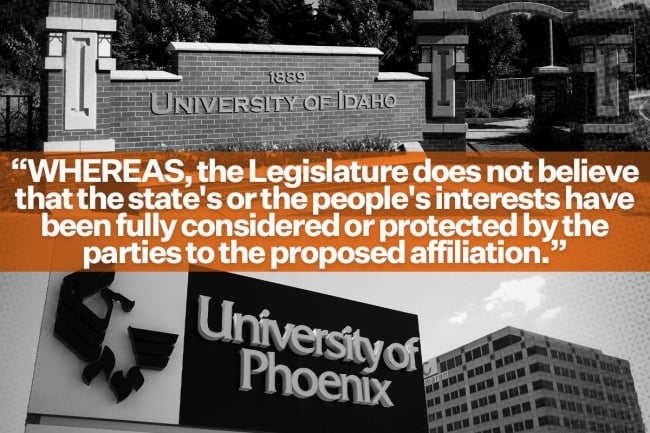You have /5 articles left.
Sign up for a free account or log in.

Idaho legislators are ramping up scrutiny of a deal for the University of Idaho to purchase the University of Phoenix, raising concerns about the secretive process and legal liabilities.
Justin Morrison/Inside Higher Ed | Education Images/Universal Images Group/Getty Images | Scott Olson/Getty Images
The University of Idaho’s complicated acquisition of the for-profit University of Phoenix hit another roadblock last week when lawmakers voted to slow the sale, citing financial risks and concerns about how the deal has been handled.
The acquisition, in the works since early 2023, has drawn sharp scrutiny from Idaho lawmakers in recent months. State Attorney General Raúl Labrador took the Idaho Board of Education to court in January, alleging members had violated open meeting laws in the acquisition effort. Though the state lost, Labrador appealed to Idaho’s Supreme Court.
A legal rematch is set for June. But the University of Idaho’s plans to proceed with the purchase suffered a setback when state lawmakers voted last week to ask the Board of Education to reconsider the deal. Legislators said in a resolution that they don’t believe “the state’s or the people’s interests have been fully considered or protected by the parties to the proposed affiliation.”
The resolution also gives legislative approval for the state to take legal action against the Board of Education if it doesn’t back off the deal.
Lawmakers are concerned about financial risk, given the University of Phoenix’s checkered background on student outcomes. They also question whether the Idaho Board of Education, which created a new nonprofit venture to facilitate the purchase, had the authority to do so.
Now with the $685 million deal inching slowly forward, university officials contend that legislative approval isn’t necessary since the purchase will be funded via the sale of bonds. (A related concern for legislators is that Moody’s Investors Service has warned that the purchase of Phoenix could cause a downgrade of the University of Idaho’s bond rating, affecting $130 million in current debt.)
Shrouded in Secrecy
When the University of Idaho first began talks with the University of Phoenix last year, there was another potential buyer in the mix: the University of Arkansas System, which was considering a deal. But in April, Arkansas trustees voted 5–4 (with one abstention) to reject an agreement with the University of Phoenix, citing concerns about the for-profit behemoth’s “terrible reputation,” among other issues.
One trustee warned that if Arkansas didn’t jump at the deal, another institution would. At the time, the University of Idaho was already engaged in talks with Tyton Partners, an investment banking and consulting firm that was shopping the University of Phoenix to potential buyers.
University of Idaho President Scott Green launched exploratory conversations with Tyton about the purchase in February 2023, while the University of Arkansas was still courting Phoenix. Based on those conversations, Green said he believed there were multiple suitors. The competition prompted Green to move quickly and quietly to get a deal done, he told the court in January during the open meetings act trial for the Board of Education.
Expediency is crucial for the purchase. If the University of Idaho fails to finalize the purchase by May 31, either party has the option to walk away. If it fails, UI will be out more than $10 million in legal costs already incurred on the deal. That has become another controversial point, since the bulk of those fees—$7.3 million—have been paid to Hogan Lovells, a major law firm where Green was chief operating and financial officer before taking the UI presidency in 2019. (Green has defended the use of Hogan Lovells, which he said was selected by UI’s general counsel.)
The Idaho Board of Education discussed the prospective purchase in closed executive sessions last March, April and May before they voted publicly on May 18 to move forward with the University of Phoenix acquisition. Those secretive sessions, which the board deemed necessary for the confidential nature of the deal, may now pose a serious complication given the upcoming June appeal before the Supreme Court over alleged open meetings act violations. Once again, timing is key: university officials have previously said bonds to fund the purchase need to be issued in May.
Despite the challenges raised by the upcoming Idaho Supreme Court case and last-minute legislative scrutiny, the Board of Education struck an optimistic tone in a statement to Inside Higher Ed.
“The Idaho State Board of Education has been and remains open to working with the Idaho Legislature on matters related to the proposed affiliation between the University of Idaho and the University of Phoenix,” spokesperson Mike Keckler said by email. “The proposed transaction remains a very fluid situation and we continue to work toward resolution.”
A Legislative Showdown
Since news of the proposed deal emerged, Green has frequently visited the legislature, where lawmakers have grilled him and other university officials on the details of the deal.
Lawmakers have proven particularly testy about being left out of the process.
Representative Brent Crane, author of the resolution calling for a pause on the deal, raised concerns about a lack of communication from university officials on the proposed purchase. He also pointed to the legal liability that may come with the deal given past actions against the University of Phoenix—including lawsuits brought by the U.S. Department of Education accusing Phoenix of illegally incentivizing recruiters based on the number of students enrolled, as well as by the Federal Trade Commission for deceptively advertising relationships with outside employers.
“The exposure to the state of Idaho is significant,” Crane argued in a hearing last week.
He also questioned whether the purchase remained true to “the vision and mission of the University of Idaho,” which has brick and mortar locations across the state but will see a rapid online expansion of tens of thousands of out-of-state students if the deal goes through.
Crane cautioned against the rush to close the acquisition.
“Any time a seller wants to sell quickly, that is not a good thing and you better make sure you slow down and do your due diligence. Another university had an opportunity to buy the University of Phoenix and they chose not to,” he said, alluding to the failed Arkansas deal.
Representative John Gannon appealed for the move to be reconsidered, arguing that it should have been put to a public vote at the outset.
Other legislators, however, praised UI for thinking ahead to stave off enrollment issues.
“I believe the University of Idaho is thinking outside the box,” Representative Lori McCann said in the hearing, suggesting the university is being proactive about the looming demographic cliff.
She also defended the way UI went about the deal by going through the Board of Education, not the legislature, noting “that is the process we have.” She added that legislative intervention could prompt UI to sue the state “for us meddling in their business.”
The House resolution, which passed last Tuesday on a 49 to 21 vote, will now head to the Idaho Senate.
The acquisition has also attracted attention from three U.S. lawmakers. In September, Democratic Senators Elizabeth Warren, Dick Durbin and Richard Blumenthal sent Green a letter raising concerns about “Phoenix’s long record of poor student outcomes, deception of veterans, and entanglements in federal investigations and enforcement actions.” They also warned that the deal “could cause great harm to students and taxpayers not only in Idaho but also across the country.”
Idaho’s Republican Governor, Brad Little, fired back with a letter of his own, telling the Senators to focus on border and federal budget issues instead. He added that he was “focused on the proposed deal’s potential”— not past transgressions.
While Little has indicated support for the deal, his office did not respond to a request for comment from Inside Higher Ed about concerns raised by the attorney general and legislators.
Damage Control
Despite the potential legal challenges, UI officials have expressed confidence in the acquisition moving ahead based on consultations with local and national law firms.
The University of Idaho did not respond to a request for comment from Inside Higher Ed on the legislative concerns, but has addressed recent state scrutiny in a post on its website.
“The state’s Attorney General has challenged some of the meetings held by our Board of Regents. After significant legal review, our board strongly believes they complied with all open meeting law requirements. Importantly, a Deputy Attorney General was present for all of those meetings,” UI officials wrote on a frequently asked questions page about the deal.
They also defended their decision not to involve the legislature in the process.
“While some may now suggest that a slower, more public process would have been preferred, this transaction moved at the speed of business to get us to this point—the point where we were able to agree to terms with the seller and could fully recognize the potential of this platform for all of Idaho,” UI stated on the FAQ page in response to a question about why it didn’t engage the legislature sooner.
UI also addressed reputational concerns raised by legislators. Officials downplayed worries about student outcomes, fines and lawsuits against the University of Phoenix as transgressions of the past. They also emphasized that “the current University of Phoenix management was put in place recently.” The university acknowledged “unrelenting scrutiny” of the University of Phoenix, “particularly from ideological opponents of for-profit colleges,” noting that the institution decided to settle rather than litigate a number of high-profile cases.
The Road Ahead
Throughout the acquisition process, University of Idaho officials have pointed to other purchases of for-profit institutions, such as Purdue University’s 2017 acquisition of Kaplan University and the University of Arizona’s purchase of Ashford University in 2020. But the latter comparison at least is perhaps less than ideal, given the recent complications that have arisen between Arizona and Ashford.
While the University of Arizona faces a $177 million budget shortfall—which UA officials have stressed was not caused by the purchase of the for-profit college—questions linger about who is responsible for $72 million in Ashford student loans discharged by the U.S. Department of Education.
Whether Arizona will have to pay back those loans for defrauded Ashford students remains to be determined. But the open question is undoubtedly on the minds of many in Idaho, where a nonbinding agreement to purchase the University of Phoenix is in place—even as a lawsuit looms before the Supreme Court and outraged legislators threaten to undo the deal.




